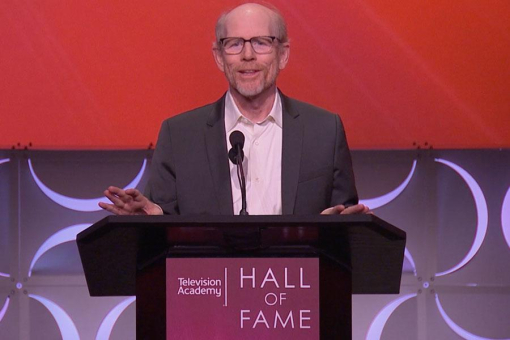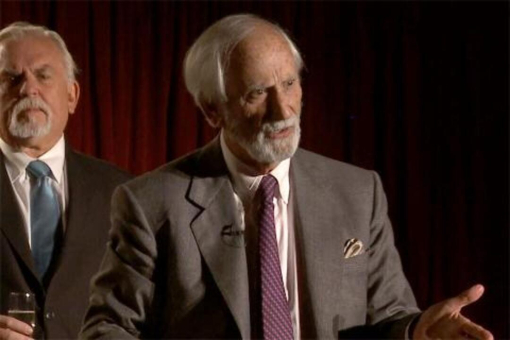The son of an esteemed film director, Jay Sandrich carved out his own distinguished career directing some of the greatest shows in television. His résumé got off to an illustrious start: His first paid industry job was on I Love Lucy, as a second assistant director. He soon served as first assistant director on such series as The Danny Thomas Show and The Dick Van Dyke Show, and ultimately honed his skills as a director on shows including The Odd Couple and The Mary Tyler Moore Show.
Sandrich also produced another fondly remembered program, Get Smart, but that experience made him realize that he preferred directing to producing. He won four Emmy Awards out of ten nominations: two each for directing The Mary Tyler Moore Show and The Cosby Show. He was nominated twice for Soap, whose pilot he directed. He directed one feature film, the comedy Seems Like Old Times. He was inducted into the Television Academy Hall of Fame in 2020.
When Emmy-winning director James Burrows was asked about Sandrich at the time of his Hall of Fame induction, Burrows — whose friendship with Sandrich began in the seventies — praised Sandrich as a mentor and a leader who created a collaborative work environment. "Jay created a safe space for the actors," Burrows said. "They all trusted in him. When you're getting everybody's ideas, if everyone's involved in the creative process and you distill those ideas, it can only make a show better."
Sandrich died in September 2021 and is survived by wife Linda and three children. He was interviewed in December 2001 by Karen Herman for The Interviews: An Oral History of Television, a program of the Television Academy Foundation. The following is an edited excerpt of their conversation. The entire interview can be screened at TelevisionAcademy.com/ Interviews.
Q: When were you born?
A: I was born in 1932 in Los Angeles and my father was a film director. So I was sort of born into the industry.
Q: What was his name?
A: Mark Sandrich. He directed the Astaire-Rogers pictures and Holiday Inn. I was thirteen when he passed away. He left me a wonderful legacy, which gave me an opportunity to work, although I wasn't aware of it at the time.
Q: Did you have any aspirations to go into the business?
A: No. When it came time to go to college and pick a major, I decided I'd try film. When I was at UCLA, I don't think there was a television department.
When I was in college, I got a phone call from a family friend who was working at the Directors Guild — my father had been president there. The guild rules at that time, 1950–51, stated that sons of members, not daughters, could be taken into the guild as assistant directors. So the family friend said, "If you're gonna get in, do it now because they're gonna change the rule." My mother helped me come up with the initiation fee, so I joined the Directors Guild. And then I went into the Army.
Q: What did you do when you got out?
A: Well, when I was in the service, I enjoyed I Love Lucy and The Danny Thomas Show. Every time I'd watch, I'd see "produced by Desilu Studios."
My then-wife was pregnant as I was coming out of the Army, so I had to choose whether to go into television or features. Features shot all around the world. And since there was a child coming along, I thought I better stay in town and go into television. So I wrote the head of production at Desilu, W. Argyle Nelson, saying, "I'm a first lieutenant in the Signal Corps and I've been making training films. I'm coming out of the Army and I'd really love to work at Desilu."
I got a letter back saying, "When you get in town, call me." I went and met with him, and he immediately gave me a job.
He made me a second assistant [director] on I Love Lucy, December Bride and Our Miss Brooks. I worked two days on each show. I didn't know it at the time, but it turned out that Argyle had been my father's assistant director on a picture. He never told me; he just hired me. That was my first break thanks to my father's legacy.
Then I went to another studio to work for the summer. I get a phone call from Jack Aldworth, who had been the first assistant director on I Love Lucy. He said, "Do you want to come work on I Love Lucy as the first assistant?" And I said, "Sure."
The reason I got that job was my father had directed Lucy's first picture. She later told me she was very nervous and kept blowing her lines, and he was really lovely to her. So if my father hadn't been in the business and been the person he was, I probably never would have gotten all these chances. So a lot of it is nepotism. Keeping your job was different, but getting the jobs — that's the only reason.
Q: How was your experience on I Love Lucy?
A: Daunting. These were the two biggest stars in America and there was a dark cloud hanging over the stage. It was not a happy place to be because Lucy and Desi were having problems.
And I didn't technically understand what I was doing. Jack Aldworth really helped me through. I'd had maybe six weeks as a second assistant. And personally, emotionally, I just wasn't ready.
The other pressure was that I was a young man starting a family. I had a wife and a child, and I spent so much time at work — six days a week, long hours, and Sunday all I did was try to catch up on sleep. I really missed a lot of raising my first child. It was a very difficult time personally.
Q: Then you moved on to The Danny Thomas Show?
A: Yeah, I was the first assistant director. That show was so much more relaxed, and I had a chance to watch the way Sheldon [Leonard] and Danny [Thomas] collaborated — how they'd find a way to make things work better. I also spent a lot of time watching how to do the cameras.
Q: Is directing something you had wanted to do? Were you asking Sheldon and Danny for the chance to direct by then?
A: Yeah. We did this pilot. Carl Reiner had written thirteen episodes of a series and had starred in it in New York, and it was not purchased. But his agent sent the scripts to Sheldon to read. And Sheldon gave them to me first, because
he didn't have time. And I said, "These are wonderful."
Sheldon read the scripts and decided we would make a pilot, but he would recast it. He put a guy named Dick Van Dyke in Carl's place. And when [The Dick Van Dyke Show] sold, Sheldon directed the first two and I was the assistant director.
The Danny Thomas Show was on a stage next door. So I started going over and watching Dick Van Dyke rehearsals. And by the third year, I said to Sheldon, "I can direct. I really know that show. I know those people. Let me direct." And Sheldon finally said, "I don't think you're ever gonna be a director. You'll be a producer someday, but I don't think you'll ever be a director."
Seven, eight years later, I win a DGA Award. It just so happened that Sheldon was presenting the award. I get up and accept the award and I tell this story. And he said, "I was right, wasn't I?" So that was his humor. But I really wanted to direct The Dick Van Dyke Show. I loved the people, loved the writing. Never got to do it.
Q: How long did you stay with Sheldon Leonard in his productions?
A: Probably four or five years. Then I worked on a pilot with a man named Leonard Stern. I helped with cameras and made a few suggestions. And Leonard really listened to what I had to say.
About two years later, I was working on a show that got canceled. Leonard had an office on the same lot, and I walked by his office and said, "If you've got any pilots coming up, I'm available."
He said, "I just got a pilot script and I'd love you to be the associate producer on it."
I said, "Great." It was Get Smart. It was the most brilliant script, but it was like a feature, nobody could afford to do this. So I made suggestions on how we could get it in on time. And the show got picked up. Leonard made me the associate producer and then the producer on the series. And that was another experience.
I decided I really liked being on the stage more than being a producer. I'd wake up at four in the morning when I was producing, thinking, "We don't have the script for next week and the edit's going badly, and we have to cast." There were just so many problems. I would worry about everything. Whereas as the director, I can't do anything at four o'clock in the morning. I'll solve the problems tomorrow with the actors.
I decided I didn't want to produce any more. I produced it for the first year and I left, and I directed one That Girl and a few Get Smarts. Then Leonard called me up and said, "I'm gonna do a pilot with Dick Benjamin and Paula Prentiss and I'm gonna direct it, but I'd like you to do the cameras."
And I said, "Great." It was called He & She. When it sold, Leonard made me the director, so it was really my first full-time directing on a series.
Q: In 1970, you began serving as the primary director on The Mary Tyler Moore Show. How did that come about?
A: Luckiest day in my career. Another wonderful director was offered the show, but they couldn't settle on financial terms. I had worked as the assistant director on a film Mary was on. And Grant [Tinker] and Mary had seen He & She and both liked it. So Grant called me up and said, "We'd like to meet with you."
They gave me an outline. I said, "This is really gonna be good. I'd love to do it. But for your sake and my sake, I don't want to do all of them. I'll do the first couple and then you bring in another couple of directors." I never did more than two-thirds of the show. I like to do other shows. I also felt it would be good to get another point of view. And all I remember was what a thrill it was to come back again later.
Q: How was the tone and the style of that show formed?
A: The tone was set in the writing. The style the director has a part in. There were two schools of comedy that were successful at that time. Norman Lear did his shows like a stage play, facing out to the audience and projecting. I felt that when you're watching television, you wonder, "Why are people yelling at each other? Why aren't they just talking?" I would always say, "We've got mics, and we're in close-up. You don't have to yell." So I brought more of a conversational style. I had them play more to each other, and I tried to keep a lot of movement and find the reality.
Q: How important is it for you as a director to be involved in casting?
A: I really think that's the biggest part of the job. For me, the two critical elements are the ability to read a script and see if you think there's something there. And then you've got to try to find actors who will not only be good the first show but will still be good in the fourth year and are interesting people. It's critical to be involved in casting. One of the reasons the casting was so good on both Mary Tyler Moore and Soap is we had so much time to develop them. We saw lots and lots of people and when the right person came along, we knew it.
Q: Let's talk about Soap.
A: Susan Harris can write — boy, could she write. And she wrote things from a woman's perspective that I had never thought about. We had a scene where Katherine Helmond's character finally sees her husband at dinner with another woman and now knows that all these years he's been lying to her. She comes home and tells her sister, "I'm so embarrassed, I don't want him to see me." And I thought, "Wow, a man would say, 'I'll kill him. I'll beat him up.'"
Q: In the mid-eighties you directed The Golden Girls pilot. Talk to me about casting that.
A: It was a Susan Harris script and I just loved it. The first name that came to mind was Betty White to play Blanche — it was a part Betty had played a hundred times. So we have her in and she reads three lines and everybody says, "Great. You got the part." [Producers] Paul [Junger Witt] and Tony [Thomas] were doing something else so I was essentially doing the casting. And we could not find anybody to make Rose work. One of the people who came in was Rue McClanahan, who I had never worked with. She read it and I said to myself, "Boy she's really good, but I don't believe her in this part."
So I said, "Would you mind looking at Blanche's part?"
And she said, "Can I do it with a Southern accent?"
I said, "Sure."
So she did it, and I call Paul and Susan and Tony and I say, "Guys, get down here."
They all agreed that she was wonderful. So now we've got two Blanches. And I said, "Betty can play Rose." They were all great to work with. The pilot was a joy.
Q: Our last question is, how would you like to be remembered?
A: I guess I'd like to be remembered as somebody who was lucky enough to be involved in some really wonderful comedy shows on television. Somebody who got it done, and hopefully had fun on the way and helped other people get through their lives. That's what good comedy and television does — it helps people get through tough times.
The contributing editor for Foundation Interviews is Adrienne Faillace.
Since 1997, the Television Academy Foundation has conducted over 900 one-of-a-kind, longform interviews with industry pioneers and changemakers across multiple professions. The Foundation invites you to make a gift to the Interviews Preservation Fund to help preserve this invaluable resource for generations to come. To learn more, please contact Amani Roland, chief advancement officer, at roland@televisionacademy.com or (818) 754-2829.
To see the entire interview, go to: TelevisionAcademy.com/Interviews.
This article originally appeared in emmy magazine issue #3, 2023.









